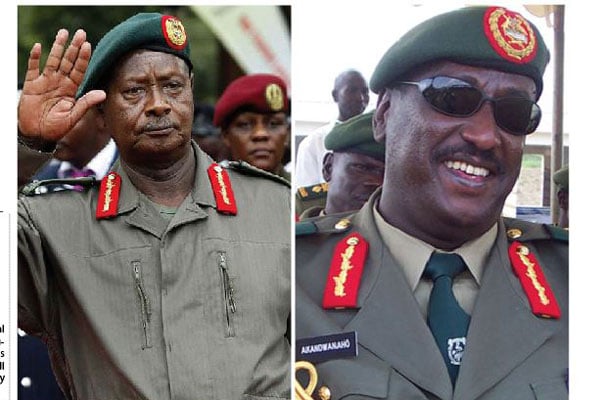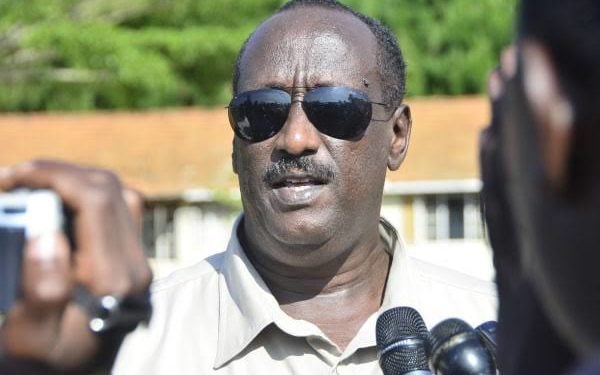Prime
Is Saleh the power behind the throne

President Museveni (left) and his brother Salim Saleh. PHOTO/FILE
What you need to know:
- The net effect of the Museveni-Saleh political partnership has been both the 37-year hold on state power and the disorganisation and lack of formal systems in the government.
The NRA/NRM marked its 37th year at the helm of state power last week, Thursday January 26, 2023.
In strict terms, the NRA started ruling Uganda in August 1985.
Taking advantage of the recent military coup, the NRA moved quickly to consolidate its position in western Uganda, home region of most of the leading commanders.
It established its headquarters in Fort Portal and announced a government-in-waiting, later defeating the UNLA to capture Mbarara in September 1985 and finally Masaka in November 1985.
Western Uganda is about a third of the total geographical area of Uganda and with Masaka and other parts of southern Buganda in NRA hands in late 1985, the NRA/NRM rule over Uganda effectively started in August 1985.
Among the most visible high-ranking NRA commanders were Fred Rwigyema, David Tinyefuza, Elly Tumwine and Salim Saleh, the brother of the NRA’s overall commander Yoweri Mueveni.
In the late 1990s and early 2000s, there emerged a view that Saleh was not the great military leader he was made out to be.
Other NRA commanders had led the actual breakthrough battles and then once they had achieved that, Saleh was brought to the frontline to get the glory and have his legend built
What would perhaps counter this narrative is that the NRA’s main enemy, the UNLA, regarded Saleh as an essential strategist of the NRA.
In early August 1985, a week after the July 27 military coup, Gen Tito Okello’s new government sent a message over Radio Uganda urging NRA commander Saleh to come out of the bush and take part in power-sharing talks with the Military Junta.
The UNLA would have known, from their own military intelligence, that Saleh was an actual force in the NRA and not just a brand created by Museveni.
Museveni made the transition from guerrilla leader to mainstream politician.
Although reluctantly and awkward in the new role of head of state, Museveni was forced to go through the motions and functions of the office -- receiving the credentials of new ambassadors, presiding over Cabinet meetings, being guest of honour at endless, tiring public events, giving speeches, listening to the small talk of delegations from upcountry districts, and so on.
Saleh never quite managed to be comfortable in a formal public role.
Impatient with protocol and formal ceremonies, socially awkward like Museveni and fellow NRA commanders like Chefe Ali, Saleh never adjusted well to the atmosphere of institutional army and government life.
His record as army commander is negligible. Few can put a finger on it.
He was sacked as army commander in 1987 and does not appear to have regretted the dismissal.
He works best as a background operative, residing where he wishes, working from home, and doing all his planning and plotting mostly away from the public eye.
The essence of Saleh’s role in NRA Uganda is that of the Chief Operative of State.
Saleh’s primary role is to keep the Museveni regime in power, Saleh being the real standby generator of the Museveni Project.
Museveni’s position as head of state meant that he could not be seen domestically and internationally to do certain things. To begin with, he just did not have time to do everything.
He assigned the (for lack of a less accurate term) “deep state” operations to Saleh.
As Museveni goes about his formal and often boring roles as President, interacting with the public as state occasions and being seen to be received by large crowds, Saleh’s role is to meet one-on-one, in the countryside or distant towns, with whoever needs to be sweet-talked, undermined, flattered, promoted, demoted, subtly threatened, and ultimately diffused as a political threat.
The basic approach by Museveni was that he must do whatever it took to retain state power and, equally important, hold Uganda together.
Have a bloated Cabinet and an uncountable number of districts, if that’s what it takes to make every ethnic group and region feel represented.
Deal harshly with the political opposition when their pressure and threat mounted; infiltrate and turn into double agents those who show a weakness for money, or co-opt into the NRM government those willing to abandon causes they believed in for the appearance of public office.
Shut down newspapers and radio stations that you feel threaten public security of your hold on power; at the same time, engage with charm with the same media when it helps portray you as moderate and when their threat is not high.
Criticise Western double standards and their interference in African affairs, but work jointly with them not just in development aid projects but as a sub-contractor in regional counterinsurgency missions in the Horn of Africa.
Rig general elections when it appears that an opposition presidential candidate is about to cause a wave of change, but allow relatively free and fair elections at the parliamentary and district level.
Be wasteful with the treasury’s resources when the need arises, but cut government expenses when fiscal discipline is required.
Be broadly pan-African in outlook and conviction for most of the time, but also covertly interfere in the internal politics and military situation of neighbouring countries when, for whatever reason, Uganda’s interests or your personal interests might be enhanced.
In short, act pragmatically, extravagantly, foolishly, illogically, wisely, honestly, cunningly, dishonestly, conciliatory or viciously as and when any of these manoeuvres and actions guarantee the one all-important, overarching goal -- to retain Museveni’s hold on power and keeping Uganda intact, of course for the latter goal (an intact Uganda) to lead to the former goal (a hold on power).
In operating this way, have no sense of shame or propriety. The outcome is what matters, not the method.
Leave the idealists and moralists to their wishful thinking and just get on with the task at hand, of constant manipulation of people, money, institutions, and public opinion.
Behind Museveni’s Machiavellian calculation and action has been the implementing hand of Gen. Saleh.
Or, more accurately, two implementing hands for many years: Saleh and Amama Mbabazi.
The roles were divided roughly this way. Museveni handles formal foreign policy and Mbabazi handles covert foreign and intelligence policy.
Museveni handles the formal military duties, while Saleh does the background military supervision and political operative duties.
These three cunning individuals were the cornerstone of the NRA-NRM starting from 1981, sometimes with overlapping between Mbabazi and Saleh, sometimes in concert, and sometimes in different roles.
Saleh’s old, sentimental ties with RPF army officers who originated in the NRA, such as Lt Gen Kayumba Nyamwasa, are what partly got relations between Uganda and Rwanda to degenerate to the point where Rwanda closed the border from March 2019 to January 2022.
Museveni’s view that to control the state a leader must control the treasure, would explain why Gen Saleh lingers in the background of the largest and most crucial financial institution in Uganda outside of Bank of Uganda -- NSSF.
In their guerrilla mentality, he who controls NSSF can fund the opposition, the media, and key public pressure and trade groups and so, in this typical Museveni outlook, have a managing director, board of directors and technocratic staff to run the day-to-day at NSSF, but keep Saleh covertly in the picture.
As the years went by, Saleh increasingly lost the pleasure of being in Kampala and relocated first to Garuga off the Kampala-Entebbe highway, then later to Gulu sometimes and mostly in Kapeeka these days.
Like Museveni, Saleh has taken to dressing informally, some might say shabbily, shirt untucked, almost like they feel there is nobody in Uganda they need to impress anymore.
The entire country is in their hands, everyone a mere pawn and piece on the chessboard.
The net effect of the Museveni-Saleh political partnership has been both the 37-year hold on state power and the disorganisation and lack of formal systems in the government.
It has achieved the two main goals -- Museveni in power and Uganda intact -- but it has undermined the institutional culture of the country whose effects we see today and we shall see much more clearly one day when the two have departed the stage.





